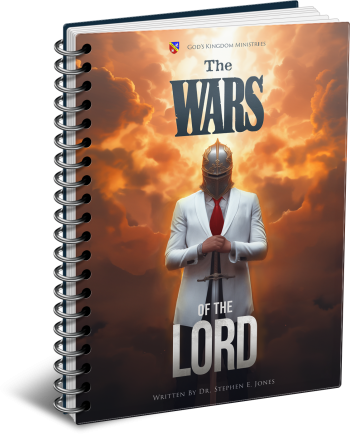Latest Posts
View the latest posts in an easy-to-read list format, with filtering options.

This 255-page book gives 50 chapters of spiritual warfare experienced by Dr. Stephen Jones from 1981-2008.
Category - History and Prophecy

There is a physical world, and there is a spiritual world which overlays it in another dimension. The physical world is a shadow of the spiritual world. The spiritual is the cause, and the physical world is the effect. Hence, when we speak of spiritual entities, we are really speaking of the spiritual counterparts to those ruling on earth. The difference, however, is that the earthly rulers live and die and are replaced by others who, in essence, rule in proxy for the spiritual entities.
These spiritual entities are called “princes” in Scripture to distinguish them from the unclean spirits and other authorities under them. The spirits correlate with individuals on earth, while the “powers” and “commanders” correlate with churches, denominations, religions, organizations, etc. Princes and Arch-princes correlate with the highest authorities on earth, whether religious, political, or financial.
Each of these is countered by a parallel good force—various levels of angels and archangels. These are the ones who do battle in the heavens such as we see illustrated in Daniel 10.
It is somewhat difficult to grasp the concept of spiritual warfare, because it is pictured in earthly terms, but it is not at all earthly in its essence. Scripture speaks of dragons and strange beasts, which, of course, are not to be taken so literally. This is only how they are pictured and expressed in earthly terms--even if the representations are “mythological.”
Daniel 10 mentions two princes: the prince of Persia and the prince of Grecia. These obviously correlate with the nations themselves (that is, their rulers), and yet they are spiritual beings. Whether they actually ARE those rulers expressed in spiritual terms, or if they run parallel to them as distinct entities is a matter for debate. To me, it does not really matter how we understand them, as long as our understanding does not keep us from joining in the battle.
When the Bible speaks of “the prince of Persia,” it is not giving us the actual name of the entity. This is a title which tells us its spiritual territory that corresponds generally to an earthly territory or place of origin. Obviously, Persia is Iran today, but this prince is not limited to Iran. Iran is merely its primary political seat of authority. The prince of Rosh, too, is not limited to Russia. Nor is the prince of Grecia (or Greece).
I first began to get revelation about the prince of Persia in 1986. I wrote about this in more detail in my booklet, The 1986 Vision of the Two Gulf Wars. I learned then that his actual name is Apollyon in Greek and Abaddon in Hebrew. We see these names in Revelation 9:11. The name is generally said to mean “destroyer,” but both the Hebrew and Greek names indicate being “lost.” Thus, the “lost” sheep of Israel in Matt. 10:6 uses the term apollumi.
Essentially Apollyon's calling or job description was to “lose” the sheep of the house of Israel. Apollyon was the spiritual force behind the earthly king of Assyria who actually deported those Israelites to Halah, Habor, and the river Gozan and the cities of the Medes (2 Kings 17:6). Was Apollyon acting on his own? Was he independent of God? Of course not. God is always sovereign over these entities, and in fact God created Apollyon to bring this judgment upon the house of Israel.
Without Apollyon, how could the prophecy of Manasseh be fulfilled? His name means “causing to forget.” Manasseh was named prophetically, because, as Joseph had said in Gen. 41:51, “God has made me FORGET all my trouble and all my father's household.” This prophesied of a later time when the house of Israel would be deported and would never return, because they were “lost” sheep and would forget their father's household. In other words, they would forget that they were Jacob's children—and Jacob's name was Israel. In other words, they would forget that they were descended from Israel.
God always took credit for doing this, but He used Apollyon and the Assyrian king to accomplish His purpose.
The spiritual battle in the heavens is not a battle of independent entities, but a battle whose outcome has been pre-determined. Since God created all of the participants, He stacked the deck in His own favor so that nothing would go out of control. And He blinded most of the participants so that they would act blindly, thinking that they had control of their own actions. You see, the divine law makes the Creator responsible for that which He owns. If He should lose the battle, He would have to hold Himself responsible to mankind for His failure. So He has no intention of losing.
The Dragon Wars of 1997-1999 saw the dragon cast down and overcome. But in 2001 we saw the end of the warfare. In other words, we were privileged to see into the future, as it were, and to participate in the end of the warfare. Time is not relevant in the spiritual world, so this heavenly warfare that Daniel fought is the same one that we have been fighting. We cannot always be sure of the “time zone” in which we are participants.